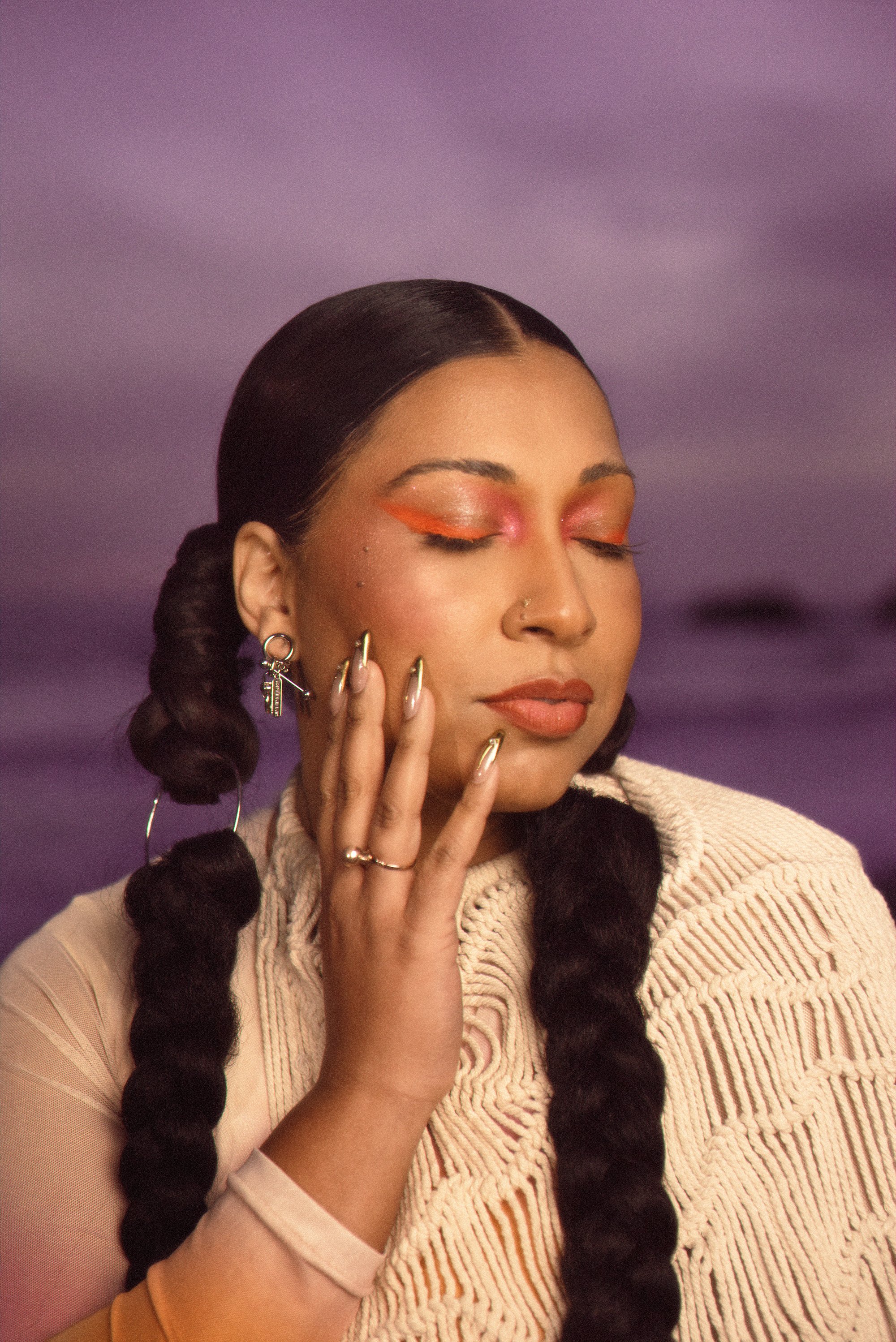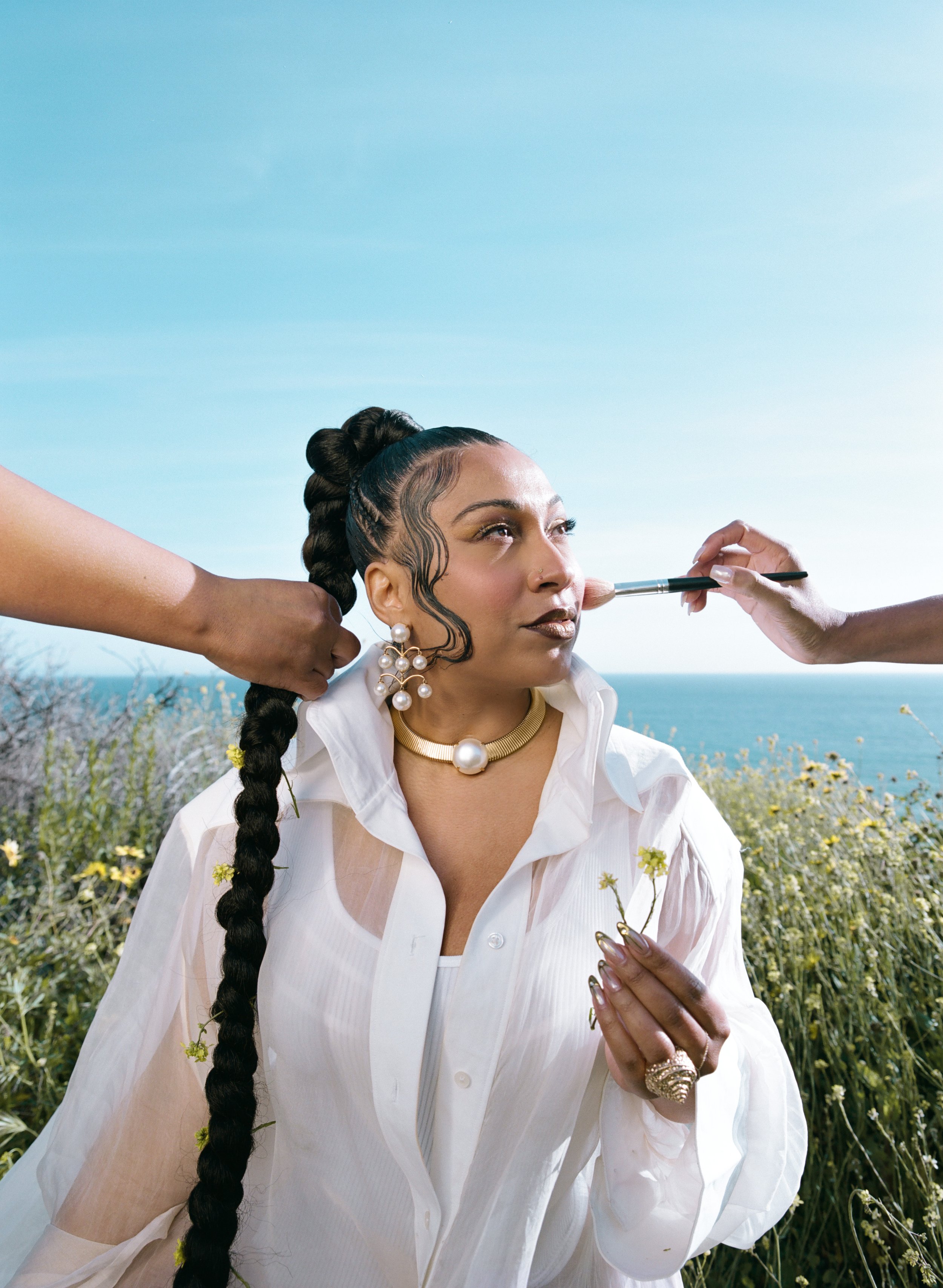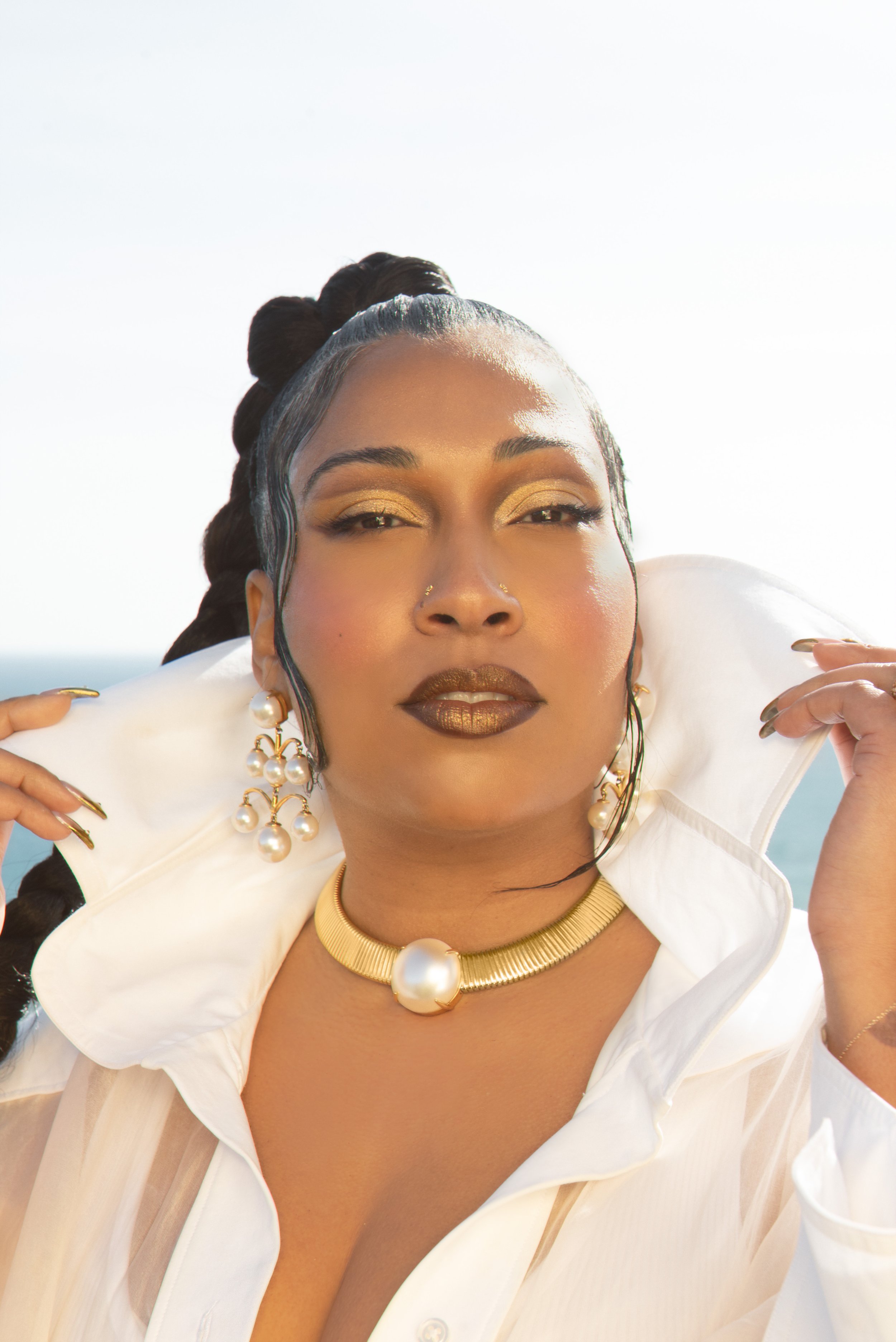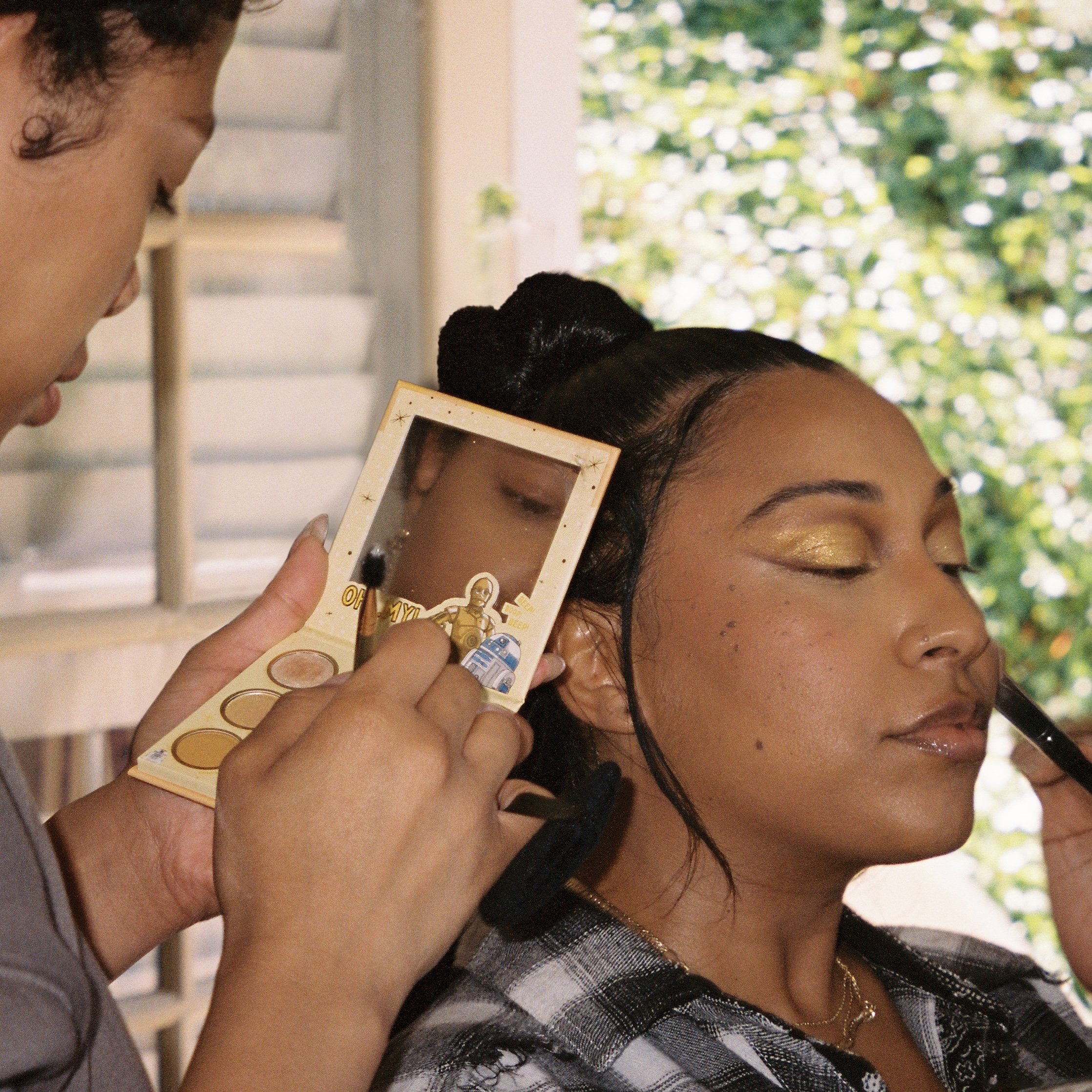“I’ve Understood the Value of Voice”: Canadian R&B Mogul Melanie Fiona Talks The Magic of Music, Motherhood and Memories
Editor: Nia Langley / Photography: Roya DelSol / Creative Direction: Jode-Leigh Nembhard, Roya DelSol / Cover Design: Malaaya Adams / Styling Assist: Cat Calica / Hair: Brandy Rice / Makeup: Nicole Guthrie, Briana Figeroux / Retouch: Roya Delsol, Jeremy Rodney Hall / Production: Jode-Leigh Nembhard / Assist: Janet Williams, Ashanti Davis
The art of rigging an antenna lies in finding the perfect sensory balance between radio waves and heartbeats. The excitement of finding the temperature of a transient tune may be bittersweet when you hear a blip of it before it disappears in the multiverse of music madness, and your sweaty hands sway a millisecond faster to the left.
Melanie Fiona would try and catch Buffalo-based Power 93.7 WBLK on the radio stereo in her Toronto childhood home. The starving desire to scrape up a few moments of R&B would be mixed with hip-hop, rock, reggae and pop, and her exposure to a rainbow of sounds originating south of the border concocted her sound––more than just vibrations but a life tune.
Fiona’s life tune was a testament to being the daughter of immigrant parents who travelled from the Land of Many Waters to the streets of Keele and Finch. Fiona was in the midst of a father whose band would play, in the basement, covers of calypso, soca, reggae and solo songs and a mother who used music to clean, yell and cook for her children––both parents scintillating warmth and love to the four walls of their home.
Retro soul filled their home with the sounds of Motown, The Platters, The Drifters, Benny King, Sam Cooke, Byron Lee and the Dragonaires, and the immutable Bob Marley. “Seeing my parents dance to a Guyanese three-step waltz is unique to my experience as an Afro-Indo Caribbean person who grew up. It’s such a beautiful thing for me. I smile thinking about these moments,” says Fiona.
As a child of immigrant parents, Fiona says that although tensions peaked because of the studious practices of “show up, be responsible, do what you got to do, and don't bring no stress into this house,” love (and food) was always present––even when money wasn’t.
Fiona was also the younger sister to an avid music collector of a big brother who put her on to sounds that travelling could only gift amid his college days. “I had this really rich upbringing when it came to the idea of how culture influenced music,” says Fiona.
Fiona’s upbringing was nestled in the intersection of culture, music and home: Toronto. Having travelled the world, Fiona says there’s a “magic of the multiculturalism in Toronto that’s like nowhere else in the world.” From the streets of Toronto, Fiona confided in the unspoken understanding of who she was. She saw it all around her; the sea of diversity that would wash up folks of faraway lands on Toronto’s shore. “I didn’t have to define it. I didn’t have to explain it,” Fiona says.
The lifetime-long city days would be spent outdoors, laughter brewing in bellies, Guyanese dishes passed around like hot potatoes, Saturday nights reverentially carved out for dominos, the visible sweat of coming home after playing your heart out for sports, and family shuffling into the home and soon too stuffed with joy to say goodbyes.
“It really shaped me as a person and as an artist, for when I would expand into the international market and be able to have an identity and tell a story from a perspective that didn't feel like it had boundaries.”
As the only Canadian-born among her big Afro-Indo Caribbean family, Fiona says there’s a sweet spot layering her Canadian origin with her traditional Caribbean base tier.
Toronto’s music scene at the time couldn’t offer her the exposure she got from home. Still, it foreshadowed the blending of Fiona’s sounds with the city's existing artistry.
CHRY-FM Vibe 105.5 was a Canadian college radio station Fiona remembers as the only place offering an ounce of Canadian hip-hop and R&B. Canadian greats like Kardinal Offishall, Jully Black, Deborah Cox, Tamia, Glen Lewis and Maestro Fresh Wes set the tone for “what Toronto hip-hop and R&B music was, and I feel so blessed to now call all of those people friends. I’ve been blessed to create and perform with them.”
“I remember singing backgrounds for Saukrates before I had my own career. It was such an honour to be in his home studio [with] Andreena Mill,” Fiona recalls. “Those are the people who showed me it was possible, even if they didn’t cross the border.”
Fiona describes Toronto’s then-music scene as a baton race. “One person passes the baton to the next [and] to the next. That’s the goal.” Fiona says this is how the Drakes of the world emerge because of the patterned and collective effort that comes with being someone’s cheerleader.
If holes could be found in the fabric of Fiona’s life tune, her birth story would stitch those holes swiftly. “I was born clearing my throat in the delivery room, and the doctor said, ‘We either have a smoker or a singer.’ I really do believe that music was always going to be my purpose.”
Jewelry: Lele Sadough / Dress: Joyin Rey
“At this point in my life, I've understood the value of voice,” Fiona shares. The voice, the instrument of our life tune, can be a loud, ominous ring that we can’t turn down or sometimes a soft, edgy chime that needs a tune-up. “I've been blessed to be able to use my voice in so many capacities––music being the foundation. But I create community and [a] platform. I speak. I think back about that doctor just right away affirming something's happening with this voice. I wasn't born crying. I was born clearing my throat. I was always destined to be this,” says Fiona.
A homegrown feeling that never leaves
Fiona’s introduction to the music industry was graciously accompanied by two Black Canadian female singers—Andreena Miller and Nicole Holness—who formed the R&B trio X-Quisite.
X-Quisite gave then-18-year-old Fiona’s firsts in the music scene: first time recording in a studio, singing with other voices, performing on television, Electric Circus markets, performing at malls, radio station features and more.
The sultry and soulful voices of X-Quisite produced songs like “No Regrets,” “Sassy Thang,” “Showing Love” and more––each showcasing what it means to be THAT woman while giving room to feelings of hurt.
“When you're in Toronto, and there are not infinite examples, especially of R&B artists, or hip-hop artists, Black artists, who are getting mainstream looks, then you have to try. [You’re thinking], ‘If an opportunity presents itself to me, I'm going to explore it because I don't know what it could be,” says Fiona. So that’s what she did.
X-Quisite swept nominations as Best New Artist at the 2002 Urban Music Awards of Canada and Best New Artist in the Contemporary Hit Radio (CHR) category at the 2002 Canadian Radio Awards.
Getting her feet wet at such a young age also opened her eyes to the realities of the music industry. Politics came in, Fiona describes, and soon people weren’t being upfront around money, and friction was created between the group.
Fiona and Miller decided to move on in 2002 not because there wasn’t “love” between members, Fiona explains, but because of the slyness of music industry practices that made it unhealthy. After their departure, the group’s album was still released the following year with two new members––and Fiona and Mill’s vocals present on songs.
Fiona says she didn’t make a dime off that project, but she walked away with priceless knowledge that made it slightly easier to face the next challenge now that she knew what to expect.
Fiona started to focus on her solo career. She went to the U.S. and met with her production company in Los Angeles, and they began to work on her solo sound. Folding her time between LA and Toronto, Fiona connected with Drake, Aion Clarke, aka Voice, and Dalton “D10” Tennant one night at a restaurant in the city that birthed them. Bonding over their dopeness, the four artists decided they didn’t want this moment confined to just that––a moment. They created The Renaissance, which became a part of Fiona’s musical footprint.
The musical group performed at supper clubs in Toronto, like the Black-owned Avocado Supper Club on Adelaide, to “sharpen [their] chops,” Fiona says. The quadruple would sing together, covering songs and performing originals. “It was never intended to be a forward-facing group as far as marketed that way. But we wanted to create a movement.”
In Toronto’s then-music scene, movements like these were accepted and shared with some resistance––a void that some may argue still exists. As a result, aspiring artists in the Canadian space felt compelled to pick up their things and head south of the border to chase a boost to their dreams Canada couldn’t offer them.
Fiona says she has had a “void of connection” with Canada. “I don't think that has to do with the fans or the people who listen and love my music and show up for me. I think it has to do with the industry in itself.”
Fiona says she’s only done one headline show in Toronto in her entire career and has never toured Canada. “I have not seen certain parts of my own home country. I think that there’s something to be said about that big time when it comes to the connection of how Canada shows up for their homegrown talent.”
“We need more spaces for us to be able to support each other, period,” Fiona says. She lists support in media outlets, small venues and events to create exposure for Canadian talent and push narratives that amplify these talents in front of Canadian audiences. Fiona thinks that Canadians often live in the shadow of America’s approval; however, she adds that we are gradually breaking out of this cycle with each year, platform, story and rising star getting attention from abroad.
Dress: Ease, Macramé Appliqué Joyin Rey
“That starts with the resources that are used for creating and supporting the creative arts in Canada, especially when it comes to creators [who are] people of colour.”
The “homegrown love feeling” Fiona longs for is appreciated when it exists. “It's something that I'm really dedicated to making sure is present moving forward in this part of my career.” “I feel blessed [that] I can come home and receive that love now. It still means just as much.” For every opportunity Canada has called her for, Fiona shows up.
Fiona honours time stamps in her musical journey like these, where she’s among people who have wonderfully established music careers. Seeing her fellow Renaissance members on the international stage and remembering times they used to sing in basements is a full-circle moment for her.
“I think, when you come from a city that has a small industry, you really cherish that even when it was uncomfortable, or it didn't work out. You're young, and you're learning your way, but when you get to look back and have those full-circle moments, it's really a beautiful thing,” Fiona says.
Canada to the World: The international stage
“We're not going to pigeonhole you into just one idea of what a Black Caribbean woman from Toronto can look like.” That’s the boundless narrative Fiona’s team agreed on when Fiona found herself on the international stage. “Being able to step out and represent Canada was amazing,” says Fiona.
“I’m so proud that I’m Canadian. First thing out of my mouth is ‘I’m from Toronto,’” says Fiona before initiating the notorious Caribbean DJ sound effect.
This stage drew parallels to the people and experiences Toronto gave her, like crossing paths with people who were Italian, Polish, Nigerian, Ecuadorian and more. Music was an international language that Fiona could use to communicate with folks in Toronto, and now on the stage, she had a view as far as where the waters meet the sky.
Opening up for Kanye’s 2008 Glow in the Dark European tour––one of her career's freshly massive steps––was an “amazing launching pad” and set the tone for the spaces Fiona’s creativity led her to not only as a singer but as a songwriter.
Fiona’s first album was strategically released internationally rather than in North America to showcase the belonging of Fiona’s sound on an international platform. At the time, Fiona’s team dubbed it “world music”––the kind that is not restricted to a city’s supper clubs or local radio stations but one that is meant to be discovered on every corner street.
“Let the music speak for itself” is what they aimed for, and it feverishly delivered. Her debut album, The Bridge, released in 2009, drew in a collection of sounds because of her exposure to a diversity of cultures, challenges and callings in her childhood. The Bridge spotlighted Fiona’s unrestricted vocals, her runs running up hills, and her range flowing with the emotions of each song.
This stage also came with being under a microscope of pressure to sound and look a certain way. Fiona says it was just about loving music growing up, but that glass of reality shattered when she realized that there was a business side. “You find yourself having to say yes to doing certain things or questioning if you’re good enough,” Fiona reveals.
Because her music was rooted as a tribute to artists and genres before her, Fiona didn’t feel like she had to personally submit to the pressures of producing sounds others wanted to hear. “I'm grateful to have had people around me who protected me and who allowed space for me to be who I wanted to be, even at times when I didn't know who I really was, because that's a journey, especially when you're doing it in the public eye.” Fiona reveals she had a female manager, Carmen Murray of Title9 Productions, who honoured who Fiona said she was comfortable being.
“The biggest pressure comes from evolving on other people's time,” says Fiona. She describes that as a young woman in the music industry, navigating your identity while having the grace to find your way is a challenge, and she feels for those coming up in this industry.
“I remember being told, ‘You speak too much for yourself.’ How many girls get told that, and who is in their corner to say, ‘That’s just not the person for you. That’s just not the label for you’?”
If Fiona had listened to the naysayers that infiltrated her space, she wouldn’t be able to accomplish a good chunk of milestones. That same year after releasing her debut album, Fiona toured with Alicia Keys as an opening act for Key’s The Freedom Tour and recorded “Fool for You” with CeeLo Green. Soon after, “It Kills Me” from her debut album topped the Billboard Hot R&B/Hip-Hop Songs chart for ten weeks and also garnered a GRAMMY nomination for Best Female R&B Vocal Performance.
Fiona was on a boat cruise in Miami performing for a party hosted by a radio station, wearing a Black dress from Toronto––and noting that Teedra Moses, an American singer whom she loves, was present––when she learned about the nomination.
Fiona’s brother broke the news after her performance, and the tears came. The first memory that popped into her mind was young Fiona singing in her room alone. “That was the Academy saying, ‘Girl, you can sing,’ and it meant a lot to me because to be recognized as a vocalist is a big deal. A song can be a hit with or without someone. But there’s something about the magic when you have an amazing song and vocalist,” says Fiona.
“Right out of the gate as my first introduction to the world,” Fiona reflects. In 2011, Fiona began recording her second studio album, The MF Life, which was released the following year. Singles like “Gone And Never Coming Back” and “4 AM” peaked on the U.S. R&B charts. The album featured artists like J. Cole, Nas, John Legend and T-Pain.
Fiona went from zero to two GRAMMY Awards in one night, receiving awards for Best Traditional R&B Performance and Best R&B Song for "Fool for You" with CeeLo Green.
Sitting with her parents and team in the far back, Fiona recalls that hearing her name washed up a string of emotions that made her forget award etiquettes like standing on stage and addressing her win. Winded joyfully, Fiona remembers running up in her six-inch Louboutins with her high-slit, summery black and yellow striped dress. “I’m like, ‘Hi, I’m Melanie Fiona.’ I still didn’t feel like I knew the world. These are people who’ve never heard your name. [The song] had no music video [or] artwork.”
Fiona remembers being incredibly emotional because Whitney Houston died the day before––the woman who gave her “every ounce” of what made her want to become a singer. Fiona references Houston’s tone, texture, song, range, impact and sweetness.
After accepting the first GRAMMY, Fiona had to stay close for the second nomination, which she also won. “[It was] a pinnacle of my success in my professional career.”
“My parents never got to see me walk to get my diploma after graduating college, but they saw me walk and get a GRAMMY, so I guess it’s not a bad thing.”
Creativity has no limits in authenticity
Fiona, now an independent artist, is grateful for the big machine of a team that comes with being signed to a major label and for that experience she says was foundational to the start of her career.
Fiona had created an album, partnered with an independent label, that never came out titled Awake, which was initially set to feature already-released “Bite The Bullet.” The song, released in 2015, paired a groovy reggae beat with passionate vocals that come alive within seconds.
A never-released album during her early independent era didn’t allow Fiona to experience the process of putting out music in this space. “Now, it feels like a reward.”
“I think that that's the real beautiful part––that I don't have any expectations to be who I once was. I've already done it, you know. I just want to be who I am now. And I want to be able to make the decisions for myself and put out music that I really love that doesn't necessarily need to fit someone's box of what their budget looks like, or what their template of success looks like.”
Fiona feels blessed to have a solid fan base that sticks beside her despite not putting out a project for years. “They're genuinely invested in me as a person and as a creative for whatever I'm doing.”
“That's the real success here,” she adds. “That I get to still create music in a different way with a different approach.”
Fiona says this era of “reframing” is “liberating.” Her creative spirit couldn’t be tamed, shaken, or confined to the boxes the music industry conceived. It was evident early in her professional journey and her upbringing as someone strongly vetted in her sense of belonging.
“I hope that every artist feels that whether they're assigned to a major [label] or completely independent, you're doing it because you want to do it, not because you feel like you have to do it,” Fiona says. “That's creative freedom.”
Creative freedom is the luxury of bringing your creativity to your palette of identities. “I’ve accomplished so many other successes in my life, from my personal development, my life, family, professional pivots in spaces of motherhood, and wellness,” says Fiona.
Fiona’s never desired to lose a sense of normalcy because of her career. “I’ve always loved the idea of a balanced feeling of having success, making money, being a creative, and then walking my son to school. Those are things that are equally important to me.”
Fiona talks about motherhood just as passionately as her musical career. “I’m not a city girl; I am a suburb girl. I got to take my son to basketball practice on Friday, and then I might have to fly to Atlanta on Saturday. I don’t have to try to be anything else.”
Fiona says having a beautiful support system for family and work helps, as well as having a husband––Jared Cotter, whom she met through music—who is also in the creative space so that mutual understanding exists.
The idea of also unapologetically exposing and allowing your children to partake in tour life, gigs and musical responsibilities is important to Fiona. “I need my kids to see me being me. For women, we are so conditioned to sacrifice. I sacrifice, don’t get me wrong. But I never want my children to be like, ‘My mom just self-sacrificed.’ I want my kids to look at me and say, ‘My mom was a boss, my mom travelled, she was good to herself, she was successful. And because I saw that, I feel like I can be that, too.’”
Fiona says that it's vital for your children to see you have your purpose outside of motherhood.
Living in America, there’s a visible difference between conversations about raising a Black son in America versus Canada. In an Instagram post, Fiona shared that her son has been invested in Black history. Growing up in Canada, Fiona wants her son to know how and where his family grew up. “Our Caribbean culture is important, and I want my children to have that. Unfortunately, out here in California, that’s not easily accessible. It’s not visible,” says Fiona.
“That's my wish for my children––for them to live and dream without limitations.” Fiona notes that it’s important to instill in them the importance of their cultural and ethnic background because that makes them special, despite the world’s efforts to make them feel like it’s an error.
Fiona has conversations like this on her podcast, The Mama’s Den, with Codie Elaine Oliver, Felicia La Tour, and Ashely Chea. She speaks about her experiences in motherhood, like her isolation period when having her son in 2016. The podcast originated during the pandemic, and Fiona met three amazing Black women and mothers who started looking forward to seeing each other on Fridays. Fiona was pregnant with her daughter during production, and she describes it as her “lifeline” being surrounded by a cushion of support this time.
“Can we just talk about the shit that nobody’s talking about?” was their intention. “Motherhood is so amazing. All true. However, can we talk about some other realities nobody else warned me about? Because I'm not getting it right every day,” Fiona says.
The Mama’s Den was launched in 2022 and cultivated a community movement of honest, candid and vulnerable conversations, which Fiona says we don’t see enough of. “Black motherhood is even more niched and more nuanced. Feeling seen, heard, and celebrated is so important as women of colour,” Fiona states.
Behind-the-scenes captures of our day with Melanie Fiona in Malibu.
“I love that most of our audience, not most, but a good majority are not even moms yet or parents,” she shares. Fiona also launched a motherhood brand, Melly Belly, during her second pregnancy as a lifestyle resource for mothers to share, shed and smile. “I’m getting ready to relaunch some stuff for that. I created a motherhood mantra medication for moms, using my voice again, in spaces of sound healing and R&B music.”
Fiona draws on the motherhood she was exposed to as the daughter of a fiery, quick-witted Aries. Her mom is a natural leader, especially in the kitchen. We see a glimpse of that dynamic in a mini Instagram series Fiona released on her page called “The Recipe: My Mother’s Story.” Fiona remembers telling her mom she needed this for her daughter to document the special pocket of Caribbean culture that fills bellies and hearts.
Among Fiona’s many talents is candlemaking, a passion project that also began during the pandemic. In the space of expanding her creative wings, Fiona’s crystal-infused candles are therapeutic to make and elude energy that smells and feels good, coming from the hands of an artist and something she loves personalizing for her community.
Fiona also gave her community a recreation of “L.O.V.E.,” a track on The MF Life that originally featured John Legend, with exclusive Canadian collaborators and an all-women team in partnership with Amazon Music. The reimagining of this over-decade-old song was a “gift” to Fiona, along with seeing her face on a big billboard in Time Square.
“It was such a gift to feel the love and the support of the industry, fellow creatives, the choir and the musicians all showing up to lend their efforts, their voices and talents to reimagine this song and put it out for the world to consume and celebrate ten years later in a completely different fashion,” says Fiona.
The same can be applied to celebrating upcoming artistry in our cities. Celebrating can look like more than playing someone's track or reposting it to your socials (all of which counts); it’s the consistent activism of uplifting that person’s creative spirit—because they can embody more than one.
“Be true to yourself,” Fiona advises aspiring Black Canadian artists trying to find their footing. “Create your own story. Stand by what you believe in, and have fun doing it. You will have people who see you and identify with you and feel you because their experience is your experience and vice versa.”
Aspiring artists don’t need to rig their stereo antennas to find that perfect song their heart is readily singing to. The luxury of marinating in Fiona’s artistry among Canadian R&B and hip-hop music pioneers is just a click away.
In the words of Fiona’s latest single, aspire to have it all.













